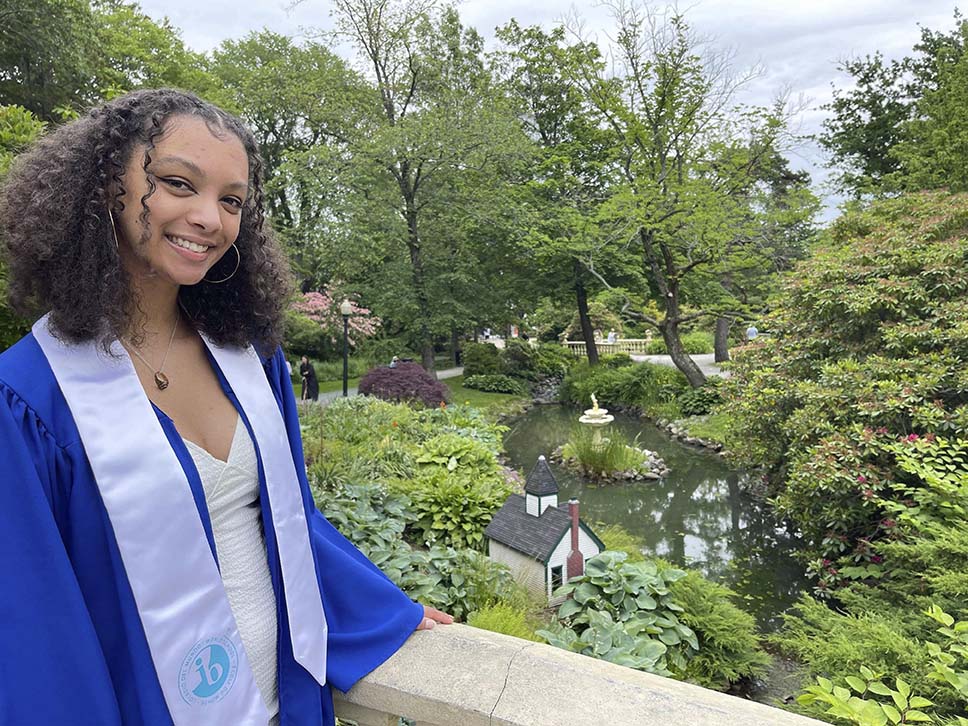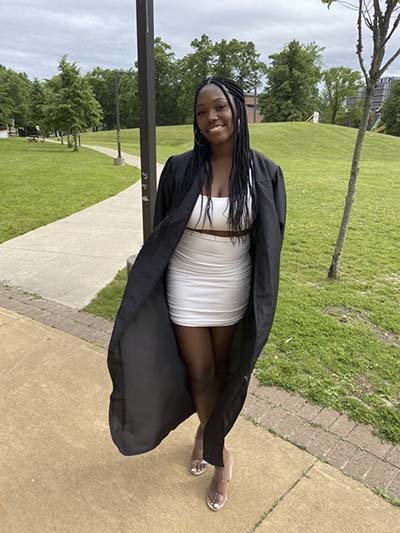Monique Nguilibet was chilling in her room in her parents’ home in Dartmouth, looking at her phone. She had applied for the Prince Scholarship at King’s and had been waiting for an email to let her know if she got it.
On the other side of the harbour, by the Halifax Forum, Kendra Gannon Sneddon was driving with her sister listening to music and singing. She too had applied for the Prince Scholarship but hadn’t heard anything. She assumed she didn’t get it.
Then her phone rang.
‘The caller ID said King’s so I picked up and the man identifies himself and asks if I have a few minutes to speak,” said Gannon Sneddon. “It was President Lahey! And I said yeah, just give me a minute. I need to pull over. He had such a formal voice and it kind of scared me and I thought—I can’t drive like this right now—so I pulled into a parking lot and then he told me I had won the scholarship.”
She shushed her sister and tried to take in what was happening. But she was overwhelmed.
“I can remember everything I did before that conversation but I have no idea what I said to the president.”
Back in Dartmouth, a little later, Monique Nguilibet’s phone rang as well. It was a busy day for King’s President Bill Lahey.
“I was really shocked,” Nguilibet says. “He introduced himself and told me I had won. I ran out to the living room to tell my parents.”

Monique Nguilibet is a 2021 recipient of the Prince Scholarship.
Excitement filled the room.
“It really means a lot. I had been nervous about starting university. I wasn’t sure how well I would do or what I wanted to do. But once I got accepted by King’s and then on top of that being awarded the Prince Scholarship, I thought maybe I am on the right track after all.”
The Prince Scholarship, created in recognition of King’s professor Dr Samuel Prince, was first awarded in 1959. It was re-established in 2018. The scholarship, valued at $24,000 over four years, is for African Nova Scotian students entering the Foundation Year Program (FYP). It is part of King’s effort to attract more Black students.
Both students come from high schools that are racially diverse. Gannon Sneddon says coming to King’s was a change, but not for the worse.
“King’s may not be the most racially diverse place but everyone there is woke. If there was any kind of racist incident I know that I would have tons of people at King’s, students and staff, who would back me up and support me.”
Nguilibet agrees wholeheartedly.
“King’s may not have the kind of diversity I experienced in high school but it does have support systems for people of colour. So even if it isn’t diverse there is a lot of support.”
Nguilibet is finding her first few months at King’s an absolute delight. She had been in the International Baccalaureate program (IB) at Dartmouth’s Prince Andrew High School. It made the transition into university a lot easier.
“I remember the first lecture I went to. I was nervous. It was on the Epic of Gilgamesh, I had read that text in high school and had really liked it so the lecture was very interesting to me. I looked around me and there was everyone else in the lecture hall making notes and listening so carefully, just like I was. It calmed me down and made me feel that I had made the right choice.”
For Gannon Sneddon it wasn’t quite as easy, at first.
“FYP sounded so interesting in reading about it before going. But then that first week had me so stressed! I was working four shifts a week at my job and I didn’t have enough time to do the readings. By the end of the second week I had figured out a routine and now I am doing quite well.”

Kendra Gannon Sneddon is a 2021 recipient of the Prince Scholarship.
Her plan is to study journalism at King’s. It is the means to achieve a righteous end.
“There aren’t enough people on air who look like me. I want to change that. I want the Black audience to feel comfortable watching me, knowing I don’t have that bias other non-Black reporters might have.”
Nguilibet isn’t sure what she wants to do in the future.
“I feel like with FYP I will be exposed to enough ideas that I will be able to narrow things down about what I want to do.”
In the meantime she is pursuing her other passion, highland dance. With some pandemic restrictions easing, competitions are once again being held and she is at the front of the volunteer line.
But both young women are being careful not to do too much outside of their studies. They want to keep their marks up. They say it is important to set an example for other Black students looking to come to King’s.

